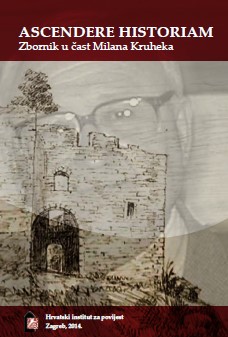Javno djelovanje Saveza komunista – Pokreta za Jugoslaviju u Hrvatskoj tijekom 1991. godine
Public activities of Savez komunista – Pokret za Jugoslaviju in Croatia during the year 1991
Author(s): Nikica Barić
Subject(s): Political history, Government/Political systems, Political behavior, Transformation Period (1990 - 2010), History of Communism
Published by: Hrvatski institut za povijest
Keywords: Savez komunista – Pokret za Jugoslaviju (“League of Communists - Movement for Yugoslavia”; Savez komunista Jugoslavije (“The Communist League of Yugoslavia”); Jugoslavenska Narodna Armija;
Summary/Abstract: Savez komunista – Pokret za Jugoslaviju (“League of Communists - Movement for Yugoslavia”, SK-PJ) was established in the end of 1990. This happened after the disintegration of the Savez komunista Jugoslavije (“The Communist League of Yugoslavia”, SKJ) in the beginning of the 1990 during the changed political circumstances which included the free and multi-party elections in all republics of former Yugoslavia. SK-PJ had strong support of the leadership of Jugoslavenska Narodna Armija (Jugoslav National Army, JNA), hence his political party was founded by the indicative of the highest officers of JNA. In this paper the public activities of SK-PJ are depicted. This political party was strong opposition and criticisms of the newly elected Croatian government, especially Hrvatska demokratska zajednica (Croatian democratic association, HDZ), the political party that had won on the first free and multi-party elections which were hold in 1990. The leaders of SK-PJ considered HDZ to be “chauvinist” and “separatist” party whose political goal was disintegration of Yugoslavia. After the proclamation of independence of Croatia and the escalation of the war in Croatia in the middle of 1991 the public activities SK-PJ were diminished in the areas under the control of Croatian government. Nevertheless, this party continued its activities in the areas occupied by Croatian Serbs. Although, there are no exact data, it is easy to argue that considerably less Croats or non-Serbs joined SK-PJ that Serbs themselves. Even more, among the members of SK-PJ there were more elderly people, mostly veterans form the partisan’s units from the period of the Second World War. It is also worth to be mentioned that the leaders of JNA had put a pressure on professional soldiers of JNA to join the SK-PJ, what most of them they had done. In spite of the fact that SK-JP was basically against Serbian nationalism and extremism, nevertheless during the “crisis in Yugoslavia” the SK-PJ was on the side of the Serbian nationalism. One have to have in mind that Serbian nationalism was commonly hidden behind the moto of “defending the Yugoslavia”. Hence, the SK-JP had never seriously criticized the politics of Serbian president Slobodan Milošević. In the meantime, Milošević has aborted the policy of preserving Yugoslavia as heavily centralised state under Serbian domination, and introduced new policy of disintegration of Yugoslavia in order to secure that all areas inhabited by Serbs in Croatia and Bosnia and Hercegovina should join the new Serbian state, by force if necessary. Finally, it has to be mentioned that in spite of the fact that Serbian nationalists as well as the supporters and members of SK-PJ were united in their hostility towards new government in Croatia, even among those two groups there were conflicts, because Serbian nationalists argued that the communism and Yugoslav unity had to be dismissed.
Book: Ascendere historiam: Zbornik u čast Milana Kruheka
- Page Range: 629-644
- Page Count: 16
- Publication Year: 2014
- Language: Croatian
- Content File-PDF

